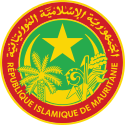
Mauritania is a presidential democracy, but has suffered from repeated military coups since its Independence in November 1960. For 18 years after independence, Mauritania was a one-party state under Moktar Ould Daddah. This was followed by decades of military rule. The first fully democratic presidential election in Mauritania occurred on 11 March 2007, which marked a transfer from military to civilian rule following the military coup in 2005. The election was won by Sidi Ould Cheikh Abdallahi, who was ousted by another military coup in 2008 and replaced by general Mohamed Ould Abdel Aziz. Mauretania underwent its first peaceful transition of power after the 2019 presidential election, although this was between two presidents of the ruling UPR party and former army generals.
The Movement for Democratic Renewal and Development, is a political party in Djibouti. It was originally known as the Party for Democratic Renewal. The PRD of Djibouti was created with the purpose of forming a national democratic party. The PRD gained popularity at the collapse of the communist bloc and the end of the Cold War. It used its military power gained through its coalition with the Front for the Restoration of Unity and Democracy (FRUD) and the Movement for Peace and Reconciliation (MPR). The current leader of PRD is Abdillani Hamariteha.

Elections in Mauritania encompass four different types: presidential elections, parliamentary elections, regional elections and local elections.

Elections in Benin take place within the framework of a multi-party democracy and a presidential system. Both the President and the National Assembly are directly elected by voters, with elections organised by the Autonomous National Electoral Commission (CENA).

Elections in Niger take place within the framework of a semi-presidential system. The President and National Assembly are elected by the public, with elections organised by the Independent National Electoral Commission (CENI).

The Rally of Democratic Forces, or Assembly of Democratic Forces, is a political party in Mauritania. It is led by Ahmed Ould Daddah.

The Union of the Forces of Progress is a centre-left to left-wing political party in Mauritania.
The Democratic Renewal Party was a political party of Benin led by Adrien Houngbédji. Houngbédji lived in exile for several years, but returned to Benin to take part in the National Conference of 1990. He built up his party largely around other exiled Beninese. PRD was legally recognized on September 24, 1990.

Parliamentary elections were held in the Republic of Dahomey on 2 April 1959. Although the Dahomeyan Democratic Union (UDD) received the most votes, they won the fewest seats. The Republican Party of Dahomey (PRD), which came second in terms of votes, won 37 of the 70 seats in the Legislative Assembly. Following the election the PRD and UDD agreed to split the seats in one constituency, with the PRD losing nine seats and the UDD gaining nine seats.

Adrien Houngbédji is a Beninese politician and the leader of the Democratic Renewal Party, one of Benin's main political parties. He was President of the National Assembly of Benin from 1991 to 1995, Prime Minister of Benin from 1996 to 1998, and President of the National Assembly again from 1999 to 2003. Beginning in 1991, he stood repeatedly as a presidential candidate; he placed second in 2006, but was heavily defeated by Yayi Boni in a second round of voting. From 2015 to 2019, he served for a third time as President of the National Assembly.

The National Assembly is the unicameral legislative house of the Parliament of Mauritania. The legislature currently has 176 deputies, elected for five-year terms in electoral districts or nationwide proportional lists.

The Republican Party for Democracy and Renewal was a political party in Mauritania. Formerly known as the Democratic and Social Republican Party, the party changed its identity and adjusted its political stance after the 2005 coup. Formerly very supportive of President Mu'awiya al-Taya and his policies, after the August 2005 coup, the party denounced Taya's policies and the mid-2006 Israeli military campaign in Lebanon.

Parliamentary elections were held in Mauritania on 19 November 2006, with a second round on 3 December. At least 28 political parties competed for seats in the National Assembly, the lower house of Parliament. Islamist parties were banned, but many Islamists ran as independent candidates. 95 seats in the National Assembly were at stake in the election, along with over 200 local councils.

Indirect Senatorial elections were held in Mauritania on 21 January 2007, with a second round on 4 February 2007. There are 56 seats in the Senate. The senators were elected by 3,688 municipal councilors, except for three who were chosen by the elected senators.
The People's Progressive Alliance is a small political party in Mauritania.

Parliamentary elections were held in Mauritania on 23 November. The opposition has vowed to boycott the election unless the president steps down beforehand. A total of 1,096 candidates have registered to compete for the leadership of 218 local councils across Mauritania, whilst 438 candidates are contesting for the 146 parliamentary seats. Some 1.2 million Mauritanians were eligible to vote in the election. The first round results yielded a landslide victory for the ruling UPR winning 56 seats and their 14 coalition partners winning 34 seats. The Islamist Tewassoul party won 12 seats. The remaining seats were contested in a runoff on 21 December 2013. The UPR won the majority with 75 seats in the Assembly.

The Dahomeyan Democratic Union was a political party in French Dahomey.

Parliamentary elections were held in Mauritania on 13 and 27 May 2023, alongside regional and local elections.









